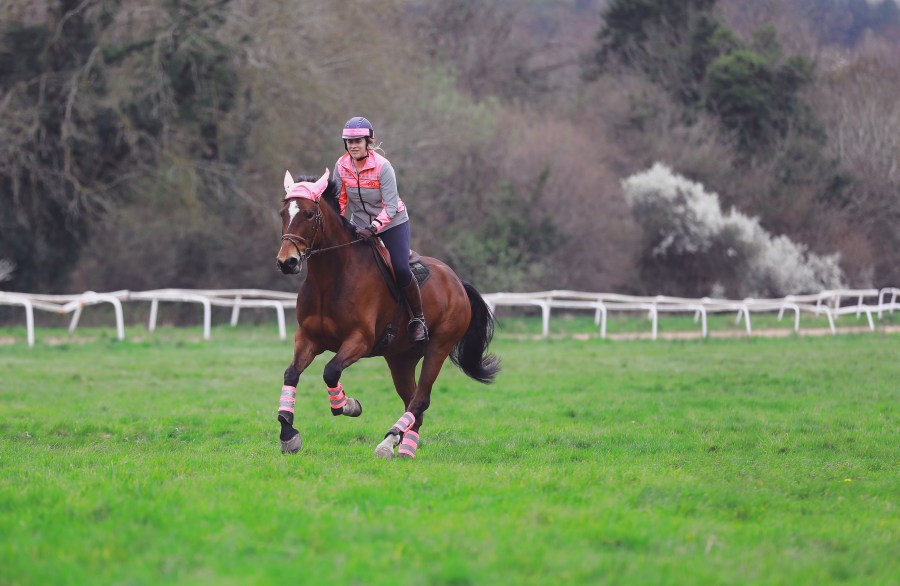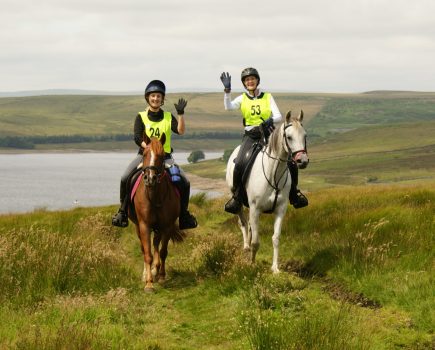#Hack1000Miles in partnership with Equisafety
There’s not much better than getting off the roads and making the most of hacking a horse along bridleways, byways and in open spaces — but what do you do if your confidence is holding you back? If this sounds familiar then don’t worry because you’re not alone. Nerves and anxiety is common among horse riders, especially when venturing out into the great outdoors.
“Some people worry about losing control, or their horse bolting, while others are concerned that they may nap, buck, or spook. Then there are external factors that can play on riders’ minds — people walking, dogs, cyclists, vehicles,” says BHS Stage 4 senior eventing coach and Ride Safe trainer and assessor Rebecca Mills. “A lot of things could be rushing through your mind, and it’s completely understandable why you might be nervous.”
Hacking in open spaces: preparation starts at home
Before you take your horse out, think about what you can introduce beforehand to prepare them for being in an open space. This may include the following:
1 Introduce familiar elements, such as opening and closing gates
“You can practise lots of skills at home before you head out, such as riding with one hand, or leaning out of the saddle as though you’re opening a gate,” suggests Rebecca. “Things like this can help you to feel more secure in the saddle.”
Practise by opening and closing your field gate while you’re riding your horse, or the gate into an arena, if you have one.
2 Ride in your field or paddock at home
If you’ve never ridden your horse in an open field, or taken them to the beach, practise this at home by lunging or riding in your paddock. This is a familiar environment, and it will help you feel secure because it is fenced off, rather than being completely open. It’s somewhere in the between of a closed in space and an open area, which is why it’s a good place to start.
3 Take your horse out out in-hand
The next stage is to take your horse out in-hand and see how they react to an open space. Before you do, ensure you have instilled good training and manners on the ground so that your horse will stop and go on command. Hone this skill in a closed area, such as your field or schooling area, first.
4 Consider what you might find when you get there
If you plan to go to the beach, for example, introduce your horse to water at home first. If they aren’t used to getting their feet wet, it’s unlikely you’ll have a successful splash in the sea, and your horse’s reluctance can quickly turn into napping.
5 Ask your instructor or a trusted friend to take them first
“If you think you’ll struggle riding in open spaces, ask a friend or instructor to take your horse out and go along to watch,” says Rebecca. “Seeing that they are fine in open spaces will give you peace of mind, so that will be in the back of your mind when you ride them.”
Hacking in open spaces: too much ‘go’ or ‘whoa’
Rebecca tends to see two main issues when horses are hacking in open spaces: either a reluctance to go forward or over-excitement.
“Napping often comes from a place of insecurity, whether that’s just because the horse is away from home and their friends, or because they’re spooking,” says Rebecca. “A reluctance to go forwards can quickly become a bigger issue, such as planting or spinning, so you need to be careful how you handle this.
“It’s important to remember that sometimes our horses need a moment to work through things mentally, so if they’re spooking, stop, take a breath and then ask them to walk on.”
If you’re riding with someone else, ask them to take the lead to see if your horse will follow. If not, Rebecca suggests that they might need ‘unsticking’.
“Just get them moving to start with. Try small circles or shapes to get them going and then head in the direction you want to go,” she advises. “Rather than trying to walk in a straight line, add in some 10m circles every few strides to stop them from planting again.”
How to cope with a horse that’s too keen
On the other end of the spectrum, your horse could enjoy hacking in open spaces a little too much, which can be equally worrying.
“It’s hard not to overreact, but remember than bucking or broncing is often coming from a place of excitement, not malice, especially if you’re riding in a big group,” reasons Rebecca. “Try to keep your horse moving forwards — even in walk or trot — with a steady contact. Pulling up can make things worse.”
You could also direct their energy into some schooling exercises. Pick something familiar that your horse will recognise, such as serpentines or spiralling in and out on a 20m circle. This will help to redirect their concentration to you rather than the environment.
What if a horse bolts in an open space?
One of the scariest things a rider can experience is to be on board a bolting horse.
“It can mean different things to different people, but bolting is when there’s nothing you can do to stop the horse,” explains Rebecca. “For a more experienced rider, this could be the horse taking off in a blind panic, while a novice rider may feel like they’ve been bolted with if the horse has sped up in excitement without them being asked to, and they are struggling to slow down. Basically, bolting is down to the rider’s perspective.”
If you’ve ever experienced this, it can wreak havoc on your confidence, both in yourself and in your horse. It can be incredibly scary, and the first thing to do is acknowledge your nerves rather than trying to force yourself to overcome them.
“You will want to build up slowly over time, and take small steps rather than huge leaps,” says Rebecca. “Set manageable goals and don’t pressure yourself.”
Introducing a youngster to hacking in open spaces
With young horses, the idiom little and often is relevant to hacking in open spaces, as is the notion ‘as early as possible’.
“When they’re young, get your horse out and about as much as you can, even if they’re not ridden,” says Rebecca. “Go out with an older, sensible horse to help boost your own horse’s confidence. If you decide to go out in a group, make sure that everyone understands and is happy to take things easy and not bomb off.”
The last thing you want to do is unsettle a young or green/inexperienced horse when they’re in a new environment. You never know what can happen, so to be on the safe side, ensure that you’re prepared.
“I’d always recommend popping on a neck strap so that you know you can hold on to it,” says Rebecca. “You might not need it, but psychologically it can help to know it’s there.”
It is understandable that a young or novice horse might be nervous when they’re in hacking in unfamiliar open spaces — ie somewhere they’ve never been before — so make sure you check in with yourself too.
“It’s easy to become tense and take hold, but this can exacerbate any nerves your horse has,” adds Rebecca. “Keep a soft contact so that your horse feels supported, and remember to offer plenty of praise for good behaviour. For the first few outings just stick to walk and build up slowly from there.”
Rebecca Mills is a BHS Stage 4 senior eventing coach and Ride Safe trainer and assessor based in Kent.
This content is brought to you in partnership with Equisafety, high viz clothing for horses and riders.
Lead image: copyright Your Horse/Charlie Gooders Photography








